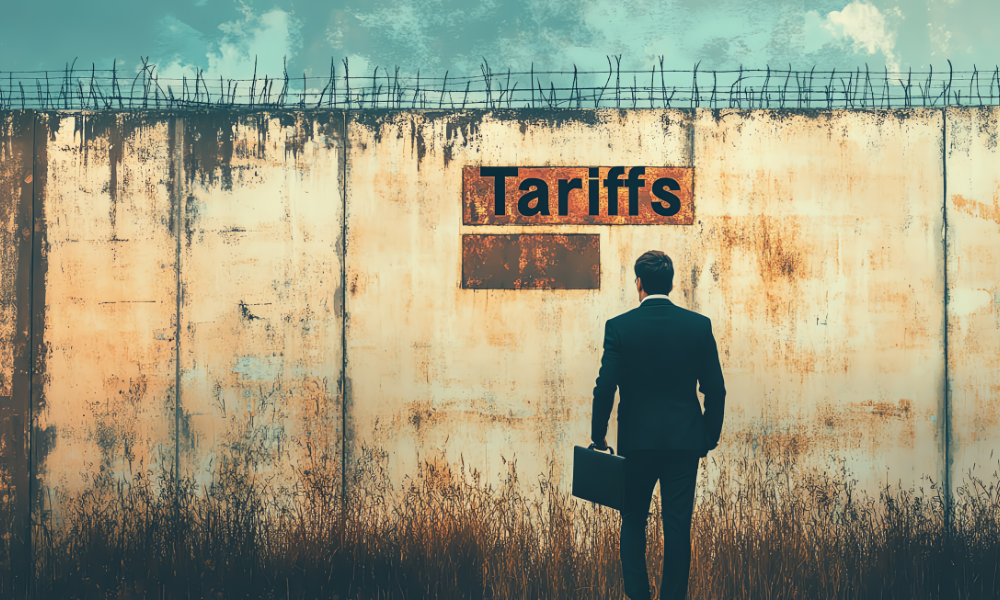

by Kristine Aquino and Ye Xie
Investors are bracing for further weakness in the US Treasury market as they bank on President Donald Trump’s tariff threats becoming reality, the Bloomberg Markets Live Pulse survey showed.
Persistent trade worries could push the benchmark 10-year yield to 4.80% in the next six months, putting it on the high end of a trading range traversed over the last several years, according to the median estimate of 153 respondents. Over that time frame, more than half of participants expect the US to place tariffs on at least some economies. More than a third expect universal levies to be enacted as well.
Yields fell to around 4.53% on Thursday.
Whatever shape a trade war takes, most investors see it as a potentially unwelcome development for the $29 trillion Treasury market. Backed by the US government, Treasuries have historically been a popular haven for investors in tumultuous times.
But tariffs are adding to worries over persistent US inflation, which have spurred bets that the Federal Reserve will refrain from cutting rates anytime soon, keeping yields elevated and pressuring bond prices. Concerns over US fiscal health have also dogged the asset class in recent years.
Elevated yields, meanwhile, have also caught Trump’s attention. Treasury Secretary Scott Bessent said earlier this month that the Trump administration’s focus with regard to bringing down borrowing costs is 10-year Treasury yields, rather than the Fed’s benchmark short-term interest rate.
Tariff headlines have done little to derail the rally in US stocks this year, with the S&P 500 up nearly 4% year-to-date and within striking distance of a record high.
Should volatility hit in the near term, however, some market participants may be hesitant to reach for government bonds. Only 22% of investors surveyed named Treasuries as their preferred haven over the next month. Gold was by far the most popular choice, with 49% of investors naming it as their top destination if markets turn rocky.
“Inflation is coming back,” said Tracy Chen, portfolio manager at Brandywine Global Investment Management, adding that she’s staying in shorter-maturity bonds and avoiding interest-rate risks. “This will reinforce that the Fed will be on hold for the foreseeable future. The chance of a rate hike is going higher, depending on how the tariffs pan out.”
Hotter-than-expected consumer inflation data lifted Treasury yields this week, though they retreated on Thursday after figures on producer prices showed declines in components that feed into the Fed’s preferred inflation gauge.
In testimony before Congress, Fed Chairman Jerome Powell earlier this week said the central bank is in no hurry to cut rates. Investors are heeding that message, and are now only fully pricing one quarter-point reduction by year-end.
In his latest salvo on tariffs on Thursday, Trump took aim at numerous trading partners and directed the US Trade Representative and Commerce secretary to propose new, reciprocal levies on a country-by-country basis.
Meanwhile, gold prices have hurtled toward $3000 and stand near record levels, despite the strength in US stocks.
And while survey respondents have their preferred havens, their overall strategy of choice in dealing with tariff—driven swings is to bet on more volatility in the next six months.
That approach has been evident in the $300 billion-plus foreign-exchange options market, where trading volumes have have skyrocketed to multi-year highs as investors pile on protection. The Canadian dollar and the Mexican peso in particular have been in the firing line of Trump’s threats in the last few weeks, and survey respondents see them as the most likely currencies to underperform amid tariff-related volatility.
“It’s going to be wild,” said Tom Tzitzouris, head of fixed-income research at Strategas Securities, about the markets. “There are so many competing forces.”
Copyright Bloomberg News

From outstanding individuals to innovative organizations, find out who made the final shortlist for top honors at the IN awards, now in its second year.

Cresset's Susie Cranston is expecting an economic recession, but says her $65 billion RIA sees "great opportunity" to keep investing in a down market.

“There’s a big pull to alternative investments right now because of volatility of the stock market,” Kevin Gannon, CEO of Robert A. Stanger & Co., said.

Sellers shift focus: It's not about succession anymore.

Platform being adopted by independent-minded advisors who see insurance as a core pillar of their business.
RIAs face rising regulatory pressure in 2025. Forward-looking firms are responding with embedded technology, not more paperwork.
As inheritances are set to reshape client portfolios and next-gen heirs demand digital-first experiences, firms are retooling their wealth tech stacks and succession models in real time.
